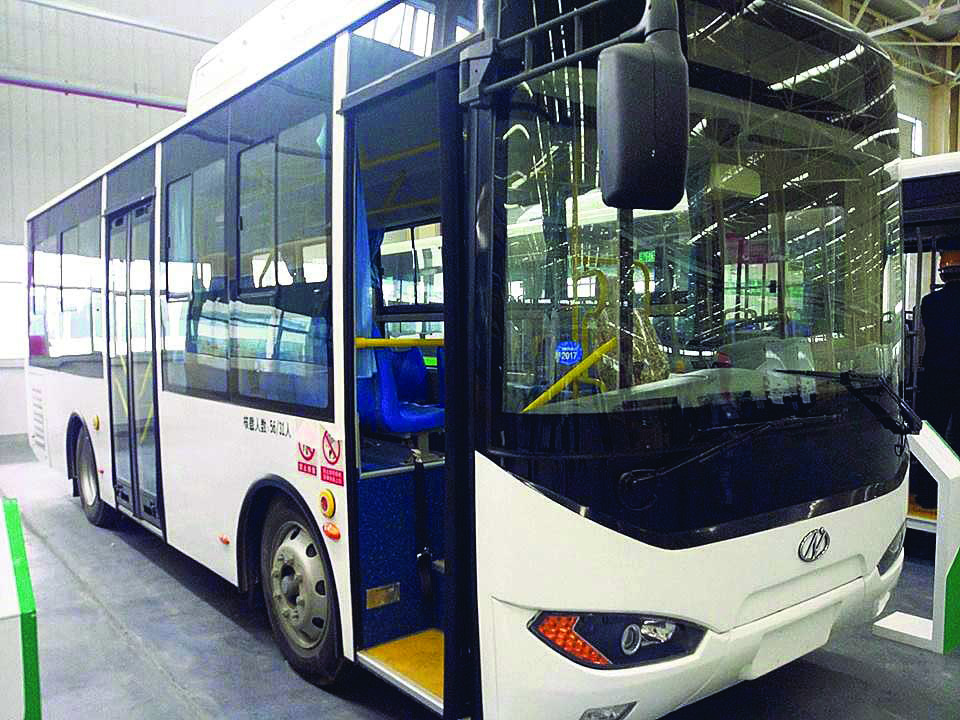
OR
Mainstream electric vehicles with law
Published On: September 11, 2018 01:00 AM NPT By: Shubhechchha Bhatta

More from Author
Nepal urgently needs an electric vehicle policy and infrastructure to cope with rapid development of EVs and to reduce air pollution and oil import
Electric vehicles—or EVs—are taking up the market now. With no tailpipe emissions, they reduce our dependency on oil and are cheaper to operate. During the last few decades, environmental impact of the petroleum-based transportation infrastructure, along with the fear of peak oil, has led to renewed interest in an electric transportation infrastructure. EVs differ from fossil fuel-powered vehicles in that the electricity they consume can be generated from a wide range of sources, including fossil fuels, nuclear power, and renewable sources such as hydro-power, solar power, wind power or combination of these. Recently, vehicles older than 20 years have been banned in Kathmandu Valley. This is going to be implemented in other cities as well. This is why it is important to discuss key aspects of EVs and find the ways to promote their use.
EVs got revival in the 21st century due to an increased focus on renewable energy sectors. While the whole world is getting governmental incentives for encouraging trend of EVs, Nepal got into it fully and witnessed the highest sales after the economic blockade of 2015.
All forms of transportation including two-wheeler and four-wheeler private vehicles as well as public buses can be replaced with Evs. Moreover, since Nepal has a high potential of hydroelectricity, it has a huge potential to replace fossil fuel in upcoming days. Air pollution from carbon emission from vehicle, which contributes up to 25 percent of the pollution, in Kathmandu Valley is having profound impacts in the livelihood of people. EVs can contribute greatly to decrease the air pollution. To benefit from the global trend and regional dynamics in transportation, Nepal needs an urgent EV policy and infrastructure to cope with the rapid development of EV and to reduce air pollution and import of petroleum oil.
According to Electric Vehicle Association of Nepal (EVAN), the total number of EVs in Nepal stands at around 21,000 as per the 2017 data. That figure is obviously much smaller compared to millions of internal combustion engine (ICE) vehicles currently plying on Nepal’s roads.
The first major reform for EVs was drafted in 2015 during Prime Minister Sushil Koirala’s government, in the immediate aftermath of the blockade. It had proposed reducing customs duty for EVs from 40 percent to 10 percent for private EVs, and one percent for public EVs. It also suggested continuing the zero percent excise duty on import of all types of large electric vehicles to be used for public transportation.
Concomitant troubles
Like every blessings come with a set of curses, as the number of electric vehicles are increasing, the likelihood of them getting involved in accidents is also increasing. The limited legislations in regard to EVs are dragging the road users into more unsafe ground of transportation. EVs are often proposed as solution for noises caused by ICE vehicles. But some features of EVs increase the pedestrian risk due to increase in detection time of the vehicles, as endorsed by recently carried out study in University in Utrecht, Netherlands.
According to Krishna Bhatta, Deputy Superintendent of Traffic Police from Metropolitan Traffic Police Division Office, Ramshahpath: “The cases of electric vehicles being caught in accidents and drunk driving are in ascending order nowadays.” “Traffic police are punishing them for drunk driving cases with fines and classes but the dismissal of licenses and follow up cannot be done due to lack of no or limited record,” he said.
Also, theft of EVs is becoming a worrying concern for the police. There are issues like accidents, difficulties to trace the vehicles, thefts and insurance. Thus Department of Transport Management should take the initiative to push for new legislation starting with number plates and license card provisions for electric vehicles at least in two wheelers.
Learn from other countries
Countries elsewhere have taken such initiatives. China, for example, forwarded the new policy for electric vehicles in 2016 providing options to the previously registered owners to apply for renewal or keeping their old number plates. Licence plates are given out either by auction, lottery or after payment of a high fee in an effort to halt car congestion, but EV buyers get licence plates free and without a wait in at least six Chinese cities.
Beijing recently announced that it’s looking for good timing to implement ban on petrol and diesel cars, following announcements by France and Britain, which said they would ban traditional fuel vehicles by 2040. In Germany, the parliament has called for a ban on fossil fuel vehicles by 2030. Likewise, the UK is also planning to end sales of gas and diesel cars by 2040. NITI Aayog, premier policymaking body of the government of India, is also working to add green colour number plates to electric vehicles (EVs) to differentiate them from ICE vehicles, so to ease implementation of subsidizing EVs.
European countries are taking lead in development and promotion of electric vehicles. Germany has National Platform for Electric Mobility as an advisory council for taking care of National Development plan for electric vehicles. The special license plates of electric vehicles add the letter ‘‘E” at the end of the license number. The purchase incentives by different companies and tax relief to some extent for electric vehicles are some of the methods to attract more customers in European countries. In the longer run, such policies could save huge percentage of energy demand for road transport, carbon emission and billions of money in petrol and diesel costs.
The day might come when Nepal’s roads will be occupied by a number of vehicles without number plates. Users dream to live in the society with perfect balance between the sustainable environment and safe road transport. A good legislation is a prime need to start with.
The author is a transportation engineer
Twitter: @ShubhechchhaB
You May Like This

Cash fine of up to Rs 200,000 proposed for misconduct by online business operators
KATHMANDU, Jan 3: The government has sought to fine up to Rs 200,000 those traders who carry out online business... Read More...

International law in Nepal is as important as domestic law: Prof Husain
The three-day US-Nepal International Moot Court Competition concluded on Sunday, announcing winners in different categories. Six teams representing six different... Read More...

Damages claim runs against law: Media law expert Timalsena
KATHMANDU, September 3: Media law expert Ram Krishna Timalsena has said that the defamation case filed by chief of Nepal Oil... Read More...




Just In
- Govt receives 1,658 proposals for startup loans; Minimum of 50 points required for eligibility
- Unified Socialist leader Sodari appointed Sudurpaschim CM
- One Nepali dies in UAE flood
- Madhesh Province CM Yadav expands cabinet
- 12-hour OPD service at Damauli Hospital from Thursday
- Lawmaker Dr Sharma provides Rs 2 million to children's hospital
- BFIs' lending to private sector increases by only 4.3 percent to Rs 5.087 trillion in first eight months of current FY
- NEPSE nosedives 19.56 points; daily turnover falls to Rs 2.09 billion
















Leave A Comment